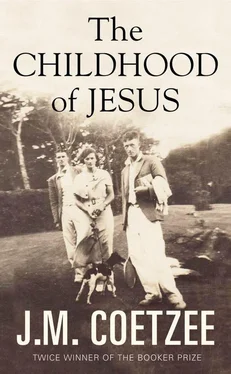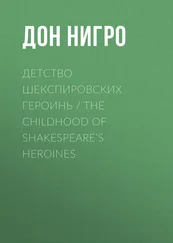‘Help!’ he gasps. ‘Help me!’
A lifebuoy slaps into the water beside him, painted in bright red and white bands. From above comes the voice of Álvaro: ‘Simón! Listen! Hold on and we will pull you clear.’
He grips the buoy; like a fish he is drawn along the quayside into open water. Again Álvaro’s voice: ‘Hold tight, we are going to pull you up!’ But when the buoy begins to rise the pain is suddenly too much. His grip fails and he falls back into the water. There is oil all over him, in his eyes, in his mouth. Is this then how it ends? he says to himself. Like a rat? How ignominious!
But now Álvaro is beside him, bobbing in the water, his hair plastered to his scalp with oil. ‘Relax, old friend,’ says Álvaro. ‘I will hold you.’ Gratefully he relaxes into Álvaro’s arms. ‘Haul!’ calls Álvaro; and the two of them, in tight embrace, rise out of the water.
He comes to himself in confusion. He is on his back looking up into an empty sky. There are vague figures around him, and a buzz of talk, but he cannot make out a word. His eyes close and he is gone again.
He wakes again to a thudding noise. The noise seems to be coming from inside him, from inside his head. ‘Wake up, viejo !’ says a voice. He opens one eye, sees a fat, sweating face above him. I am awake , he would like to say, but his voice has gone dead.
‘Look at me!’ say the fat lips. ‘Can you hear me? Blink your eyes if you can hear me.’
He blinks.
‘Good. I am going to give you a shot of painkiller, then we will get you out of here.’
Painkiller? I have no pain , he wants to say. Why should I have pain? But whatever it is that speaks for him will not speak today.
Because he is a member of the stevedores’ union — an affiliation of which he was not aware — he is entitled to a private room in the hospital. He is tended in his room by a team of kindly nurses, to one of whom, a middle-aged woman named Clara with grey eyes and a quiet smile, he grows quite attached in the weeks that follow.
The consensus seems to be that he got off lightly from his accident. He has broken three ribs. A sliver of bone had punctured a lung, and a small surgical operation was needed to remove it (would he like to keep the bone as a memento? — it is in a phial by his bedside). There are cuts and bruises on his face and upper body, and he has lost some skin, but there is no evidence of injury to the brain. A few days under observation, a few weeks more of taking things easy, and he should be himself again. In the meantime, controlling the pain will be the first priority.
His most constant visitor is Eugenio, who is full of remorse for his incompetence with the crane. He tries his best to comfort the younger man — ‘How could you be expected to master a new machine in so short a time?’ — but Eugenio will not be comforted. When he surfaces from his slumbers it is more often than not Eugenio who swims into his vision, watching over him.
Álvaro visits too, as do other comrades from the docks. Álvaro has spoken to the doctors, and bears the news that, even though he may expect a full recovery, it would be unwise for him, at his age, to go back to a life of stevedoring.
‘Perhaps I can become a crane operator,’ he suggests. ‘I couldn’t do worse than Eugenio.’
‘If you want to be a crane operator you will have to transfer to Roadworks,’ replies Álvaro. ‘Cranes are too dangerous. They have no future at the docks. Cranes were always a bad idea.’
He hopes that Inés will come visiting, but she does not. He fears the worst: that she has carried out her plan to take the boy and flee.
He mentions his concern to Clara. ‘I have a woman friend,’ he says, ‘whose young son I am very fond of. For reasons I won’t go into, the education authorities have been threatening to take him away from her and send him to a special school. Could I ask you a favour? Could you telephone her and find out if there have been any developments?’
‘Of course,’ says Clara. ‘But wouldn’t you like to speak to her yourself? I can bring a telephone to your bed.’
He calls the Blocks. The telephone is answered by a neighbour, who goes off, comes back, and reports that Inés is not at home. He calls later in the day, again without success.
Early the next morning, in the nameless space between sleeping and waking, he has a dream or vision. With uncommon clarity he sees a two-wheeled chariot hovering in the air at the foot of his bed. The chariot is made of ivory or some metal inlaid with ivory, and is drawn by two white horses, neither of whom is El Rey. Grasping the reins in one hand, holding the other hand aloft in a regal gesture, is the boy, naked save for a cotton loincloth.
How the chariot and the two horses fit into the little hospital room is a mystery to him. The chariot seems to hang in the air without any effort on the part of horses or charioteer. Far from being frozen, the horses now and then paw the air or toss their heads and snort. As for the boy, he does not seem to tire of holding his arm up. The look on his face is a familiar one: self-satisfaction, perhaps even triumph.
At one point the boy looks straight at him. Read my eyes , he seems to be saying.
The dream, or vision, lasts for two or three minutes. Then it fades, and the room is as it was before.
He tells Clara about it. ‘Do you believe in telepathy?’ he asks. ‘I had a feeling David was trying to tell me something.’
‘And what was that?’
‘I am not sure. Perhaps that he and his mother need help. Or perhaps not. The message was — how shall I put it? — dark.’
‘Well, remember that the painkiller you are taking is an opiate. Opiates give us dreams, opium dreams.’
‘It wasn’t an opium dream. It was the real thing.’
From then onward he declines the painkillers, and suffers accordingly. The nights are worst: even the slightest movement brings an electric stab of pain in his chest.
He has nothing to distract him, nothing to read. The hospital has no library, offers only old numbers of popular magazines (recipes, hobbies, women’s fashions). He complains to Eugenio, who responds by bringing him the textbook from his philosophy course (‘I know you are a serious person’). The book is, as he feared, about tables and chairs. He lays it aside. ‘I’m sorry, it’s not my kind of philosophy.’
‘What kind of philosophy would you like instead?’ asks Eugenio.
‘The kind that shakes one. That changes one’s life.’
Eugenio gives him a puzzled look. ‘Is there something wrong with your life then?’ he asks. ‘Aside from your injuries.’
‘Something is missing, Eugenio. I know it should not be so, but it is. The life I have is not enough for me. I wish someone, some saviour, would descend from the skies and wave a magic wand and say, Behold, read this book and all your questions will be answered . Or, Behold, here is an entirely new life for you . You don’t understand that kind of talk, do you?’
‘No, I can’t claim that I do.’
‘Never mind. It’s just a passing mood. Tomorrow I will be my old self again.’
He should plan for his discharge, his doctor tells him. Does he have somewhere to stay? Is there someone who will cook for him, care for him, help him to get around while he mends? Would he like to speak to a social worker? ‘No social worker,’ he replies. ‘Let me discuss the matter with my friends and see what can be arranged.’
Eugenio offers him a room in the apartment that he shares with two comrades. He, Eugenio, will be happy to sleep on the sofa. He thanks Eugenio but declines.
At his request, Álvaro investigates nursing homes. The West Blocks, he reports, have a facility which, though intended for the care of the aged, also takes in convalescents. He asks Álvaro to put his name down on the facility’s waiting list. ‘It’s a bit shameful to say,’ he says, ‘but I hope there will be a vacancy before too long.’ ‘If there is no ill will in your heart,’ Álvaro reassures him, ‘that qualifies as a permissible hope.’ ‘Permissible?’ he queries. ‘Permissible,’ Álvaro confirms.
Читать дальше












